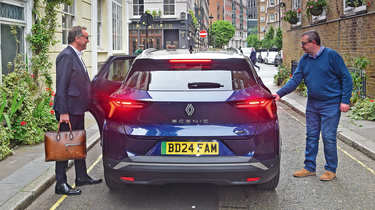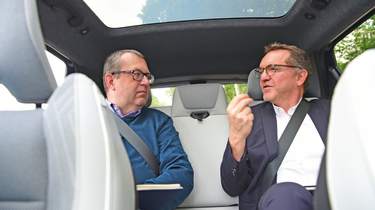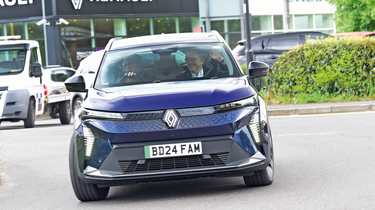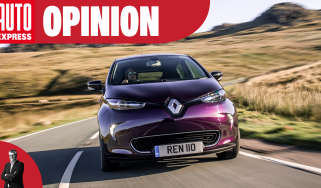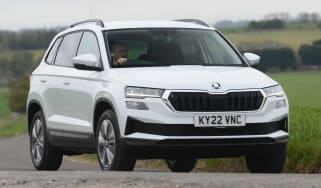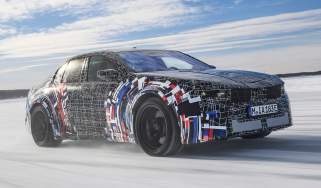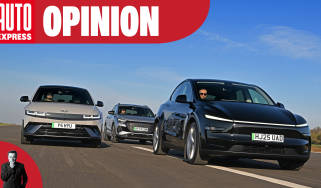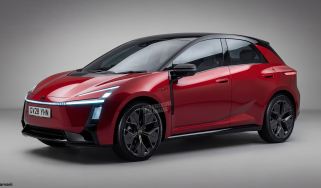Viva la Renaulution! Out-going Renault UK boss reveals brand's future plan
Out-going UK boss discusses laying the foundations for Renaulution
The French have a reputation for being quite emotional. But as we speak to Renault UK’s boss shortly before he departs for a new role with the company in France, he tells us he reckons British customers have a warm-blooded streak running through them too – and in a way, he’s counting on it. “I think in the UK you are emotional people,” says Guillaume Sicard, “and you like cars, and you like heritage. Right?”
There are many elements rolled up in the Renaulution – the catchy moniker for the French manufacturer’s rebirth, restructuring, reinvention and rediscovery. But Sicard believes that the one that might resonate most strongly with his corner of the global sales spreadsheet is the affection many of us have, or have had, for Renault products. Older generations may get bleary-eyed thinking about their 16 or the humble Supercinq. Others with more recent experience may remember Nicole and Papa’s Clio antics, or even how the bustle-booted first-gen Mégane could swallow your entire life, whole.
“Look at the Clio,” Sicard says. “It’s 30-something years old, with good success in the past, good TV commercials. I mean, it’s a car that has worked its way into the genes of a lot of people – it certainly does have something in terms of emotion.
“And now, when you look at the latest generation, we’ve launched it with a new design, with a hybrid version that has terrific price positioning; the Clio is back onto the rankings in terms of being a loved car. I can even read from dealers and the press that we are the new ‘Fiesta choice’ because that car isn’t here any more. Fiesta is so local, so ‘British’ – that I feel incredibly proud when I read that.”
It’s Monday morning, and we’ve just picked up Sicard from the headquarters of the Society of Motor Manufacturers and Traders, where he’s had another update on EV targets, Government policy and industrial strategy (he waves his arm when we query how the meeting went – Gallic for ‘don’t go there’). The agreed subject matter is the Renaulution – how Sicard feels it might work for UK customers, and how it’s going so far – while being chauffeured from central London to one of Renault’s prime dealerships in Enfield.
Perhaps naturally, our conversation starts with the fortunes of Renault’s first rethought model, the pure-electric Megane, and the car we’re riding in the back of: the new Renault Scenic, a famous badge (and another model that sold in spades to British punters) now applied to a chunky family SUV instead of a compact people carrier. Both cars have been flag bearers for the Renaulution too, because they show what the firm can do with pure-electric powertrains and platforms.
Not that this final element is Sicard’s focus. Anything but, in fact. “The way I position this car, with the [sales] teams in training and everywhere, is to tell them, ‘Don’t talk about Scenic being an EV. Don’t say, ‘Oh, Renault is launching a new EV.’ Just say Renault is launching the best family car. We think we have here the best family SUV in terms of safety, in roominess, in technology, connectivity – a lot of clever things. And then you can say, ‘By the way, it’s an electric car – but don’t worry, because the range is massive’.”
Electrification is one of the pillars of the Renaulution; the brand has committed to transferring its model line-up to more efficient powertrains, with a pure-electric mix of 90 per cent by 2030. “The Renaulution is really about the new line-up of cars and the electrification,” Sicard confirms. “And on the second of those, we are doing very well, because electrification is ‘hybrid’ plus ‘electric’. Last year we were 72 per cent electrified sales, in a market that was at 36 per cent. We’re the fourth brand in terms of hybrid sales; I mean, who would have thought this of Renault, even two years ago?”
Even so, Sicard is pragmatic enough to accept that screaming ‘EV’ from the rooftops isn’t necessarily the right tactic, for now at least. “When I see advertising that says ‘The new EV from whichever brand’, to me, it blocks the people. It generates anxiety. We’ve decided that we’re going to talk about the car first, because that’s where the interest starts, not in the fact that it happens to be EV. Scenic is a perfect example of that.”
The new Renault 5 might be another. A design study found gathering dust in the back of the studio by incoming boss Luca de Meo, the 5 has, in near-record time, been transformed into an all-electric icon in production form – a pint-sized halo model for the Renaulution. “It certainly looks promising,” Sicard says. “We’re going to launch the car properly in the UK at the start of next year, but already we have 8,000 registrations of interest from potential buyers. I’ve never seen that in my time in the UK.”
That’s potentially significant because the 5 won’t be a cheap small car; its strong design focus and the rich seam of heritage that it taps into make it perhaps more of a rival for the MINI Cooper than a successor, or even partner, to the Clio. “The scope of prices will expand in Renault,” Sicard admits, “but I think we can be premium without being expensive. And the 5 is just what we want to help with that.
“I was looking at the feedback so far about the 5 and maybe this is a bit pretentious, but it made me think about the iPhone. That’s a mass-market product that, in the western world at least, a lot of people want to have, or have – but it’s also quite premium in the look and feel, because it’s intuitive. “If you look at the elements, you need to have the design, which is first. Then probably tech, which needs to be at the right level and human focused. And then the third thing is a story, because there’s a story behind Apple. Maybe it’s not the case of Renault itself, but the 5 can have a story as well. I think if we manage those three, it’s possible to have a beautiful marketing concept that actually mixes mass-market and premium at the same time.”
The other notable point about this new-model strategy is that it includes a wide diversity of smaller-sized vehicles (we haven’t yet mentioned the Renault 4, which will offer more jacked-up practicality than the 5). However, the car industry, we’re told, is finding it ever more difficult to justify developing and building anything smaller than a five-door family SUV. Why does Renault think it can make it work?
“I think there are a couple of reasons,” Sicard says. “The first one is that Renault has a mandate to offer mobility to everybody. That’s important in each and every meeting that we have: we have to offer mobility to all – the people who are under financial constraints, the people who have money. I know it can sound a bit negative to say we’re a ‘popular’ brand, but this is in our genes: we’re a brand for all kinds of people. This is what we want to do.
“The second point is that Renault has gained a lot of expertise in building small cars and being able to make money. We’re not a philanthropic organisation; we have to make a profit from small cars, just like we have to do from larger models, or commercial vehicles. This comes from all of the expertise that we have in the Renault Group; the know-how of Dacia, for example, or our experience making lighter cars, designed to cost.
“So yes, the strategy of selling smaller cars is definitely one that we’ll keep – because it’s profitable, and because it’s in the genes of the company to keep offering all kinds of mobility. The project that Luca has started, called Legend, which is really Twingo, is about a very attractive, 100-per cent electric vehicle that will be affordable for everybody and given them urban mobility.”
Sicard is, as we mentioned at the top of this piece, about to move back to a role in France, after several years helping to transform Renault’s business here. And it has been transformed; customer-satisfaction figures are up, sales are up, the market share of the UK’s commercial-vehicle segment is now a healthy eight per cent.
It hasn’t been easy, he acknowledges, but he believes that the Renaulution vision has helped to galvanise more than just the design and engineering teams back at base, creating cars such as the Scenic and 5.
“What we’ve done with Renaulution is give some sight of how Renault will look in five and 10 years’ time, and with a high level of credibility that has also been helped by the progress of the first two years being even faster than what we first thought possible,” he says.
“I would say today that it’s easier now for me to talk to our investors about the Renault Group and the brand; we’re investing strongly more in people than infrastructure, if I’m honest. But I believe that getting the right people and training them correctly is a key factor in our ability to continue to deliver.
“The UK is a specific case, because big dealer groups have such wide portfolios of brands. They’re like investment groups, and they have to invest their money wherever they believe the future is brightest; that’s always going to happen. They can allocate resources but people are rolled into that – the best sales staff, the best technicians and so on.
“What we’re seeing now is that our clear strategy is working, and helping us to accelerate also on the customer-service front. If we take a look at the NFDA [National Franchise Dealers Association] scores, we were last two years ago. Now we’re just outside the top 10, out of 33 brands. There’s more to do, of course, but I think you can see now that the dealer groups understand where we’re going.”
This last comment is perfectly timed, in fact, because we’re pulling into the forecourt at Renault’s Enfield showroom. We take to the driving seat for a few quick laps of the surrounding roads so snapper Pete Gibson can capture the Scenic in action; then we decamp to the back of the dealership, where there’s already a healthy line-up of products – including the flagship Austral and the newly introduced Symbioz and Rafale. And that’s before the 5, 4 and Twingo turn up.
There’s not exactly a whiff of fresh paint about the place, but it’s clear that the arrival of the UK boss has not gone unnoticed. And to compound matters, Renault Retail’s Commercial and Marketing Director, Elina Karppinen, has popped in for a quick catch-up with Sicard on how the customer experience is evolving.
The update, it turns out, is that, like many brands, Renault is having to become far more adept at mixing the customer’s digital journey – watching videos online, reading reviews, scrutinising spec sheets – with physical touchpoints in the dealership.
“We have to adapt not just to EV sales, but also to the way consumers are behaving,” Karppinen tells us. “If you look at the old days, people used to walk into a dealership and go through the whole process there. Nowadays, it’s rare for them to arrive unannounced; they want to make an appointment, make sure the car they’re interested in seeing up close, or test driving, is available.
“That starts online – which could be a form, or a live chat enquiry. And we have to make sure we train our sales teams on how to handle that.”
She adds: “I think the digital space might be one area where Renault has been lacking, but we’re doubling our efforts to be better. There are lots of useful tools, too – even AI can play a part, because it can strike the right tone if you’re having a conversation in a chat window and asking about a car. AI will talk to you, provide all the information you need, and you’ll actually think you’re talking to, say, Elina in Enfield.
“And this is all before the person gets anywhere near the dealership; when they do, we have to make sure we have the right experience there – everything from half-decent coffee to comfortable chairs. This is why AI can’t replace a sales team; if it’s all working properly, AI will be making sure more buyers get to the real people in the dealers, and then they’ll be doing a better job of looking after those customers.”
It’s time to wind up; Gibson grabs a couple of fresh portrait shots, and we’re done. A morning with Sicard has reaffirmed a few key elements of the Renaulution that might otherwise get lost in the noise about the 5. Yes, EVs are a key part of it. But so, for the foreseeable future, are electrified vehicles that more of us can afford.
Renault’s reputation, particularly in the UK, is founded on delivering practical, attainable everyday transport that moves mainstream car buyers. Powertrain aside, it’s clear that this remains at the core of the brand’s introspection, and is central to its future.
Now read about how Renault is building the tech required to replace the engine...


